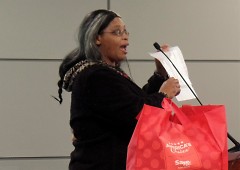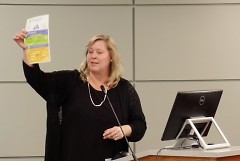The Grand Rapids City Commission meeting room held extra chairs as well as news cameras Tuesday, February 21, 2017. The special set-up was to accommodate the attendance of Homes For All, a collective of city residents there to speak to the commissioners about the housing crisis and gentrification.
Residents speak out
According to Homes for All representative Peggy Vandenberg’s statement, 100 residents had gathered at Baxter Community Center on February 9. Through their shared stories, they confirmed that affordable housing in the city is currently in short supply, with “long waiting lists.” Other community members commented at that meeting that many areas in Grand Rapids have been cleared for new development projects over the last several years, with more coming. The new development has attracted higher-income residents and investors who can outbid these long-time residents for the remaining available housing. “Students are willing to pay more for rent than traditional families can afford,” said Vandenberg. Residents named “systematic oppression of the Black community,” “greed” and “not investing in Black neighborhoods” as root causes for the current problems.
“U.S. housing policies” were also said to contribute to the crisis. Residents have noted that as the median income in the area rises due to the gentrification, so do the federally set income limits for affordable housing, making it unaffordable for those still living on minimum wage from jobs in the lower-paying service sector.
The meeting
The Commission began the meeting with a speaker meant to address the housing crisis concerns. Connie Bohatch is the city's Managing Director of Community Services. Bohatch offered a handout that explained that housing is considered affordable when it costs about a third of a household’s gross income. If housing costs use up more than 30 percent of the budget, the family often struggles to cover food, clothing, transportation, and other basic needs. According to the U.S. Housing and Urban Development website, "A family with one full-time worker earning the minimum wage cannot afford the local fair-market rent for a two-bedroom apartment anywhere in the United States."
For low-income households, Bohatch explained that there are federally subsidized housing units, which currently are in short supply. Some rough calculations from the table provided by Bohatch shows this: a family of 5 with two income-earners grossing $10.40 an hour each (for 40 hours a week) could pay over $1000 in rent a month and still be considered to be living in affordable housing. This label often qualifies the property owner for tax credits.*
Bohatch also shared that about 3500 affordable housing units in the city have been added, repaired, or rehabilitated since 2012 with federal funds, with the vast majority of those being repaired or rehabilitated.
During the meeting, Chi Benedict, a resident of the West Grand neighborhood (and not part of Homes for All), spoke about an agenda item that seemed to indicate more gentrification on the Westside. A proposed zoning ordinance, part of the GR Forward plan, would allow 16-story buildings to start encroaching her residential neighborhood. In comments at an earlier meeting Benedict expressed concern that this would drive further displacement in an area where families are already struggling.
In a comment after the meeting, Benedict said, “Many think the changes are happening too fast.” In her own experience with the community engagement part of the GR Forward planning, Benedict said the meetings were held in the middle of one of the cold and snowy recent winters, and she had trouble getting her neighbors to attend the meetings and take the time to form and share an opinion. But she said many comments on the GR Forward online page indicated that people had concerns about limited parking, as well as tall buildings moving too close to residential neighborhoods. Benedict also read a resident statement that expressed disappointment with the lack of community engagement when making more major changes to the Westside. The item was tabled for further discussion.
At the end of the official Commission meeting, which included discussion of a study for a bike-share program and renovation for Clemente Park, the representatives for Homes for All and other residents spoke during the public comment period.
Public comment: personal stories, possible solutions
Martha Cooper, a resident, shared that she had been homeless twice and she was worried about families. “We have lots of shelters. But shelters only let you stay 30 days. Where do you go then?” LaDonna Norman added in her statement, “Shelters often won’t let a family stay together.”
Cooper also wondered, “We have a giant influx of big business and money. So our median income - what’s going to happen to those numbers?” Cooper criticized plans to build apartment buildings with insufficient parking. “They say there will be retail shops on the first floor and those will create jobs,” Cooper said, “but those are parents who are working for less than ten dollars an hour, and they’ve got to pick their kid up at three, and taking the city bus doesn’t really cut it when you’re a single parent and you’ve got a kid who’s too big for the stroller. That's the reality.”
Raya Lewis, a young girl, explained how poor living conditions and overcrowding were leading to vermin in her apartment, including roaches, bed bugs, and mice, something she and her mother say they have never had before. Adriane Lewis, her mother, brought in a bagged sample of the bedbugs found in her daughter’s bed. Raya confirmed that the vermin created environmental hazards that affected her breathing and her mother’s health. The family believes that the landlord is not addressing or treating the issues properly.
Upon hearing their story, LaDonna Norman had commented earlier, “We have to look for landlords that only do shoddy fixes on the property to get people moved in. They want to just hold on until they can sell the property for more money as gentrification moves into their neighborhood and values go up."
At this meeting, Adriane asked that if the city couldn’t help her fix the situation, "Can you help me find a place to move without becoming homeless?" The city asks anyone facing homelessness to call 2-1-1.
Dain Gates of Homes for All asked for the members of the collective to stand while she spoke. About a third of the people in the room rose.
Gates spoke to solutions the city could implement. “We at Homes for All ask the city to revise the qualifications for tax abatements to strengthen incentives for affordable housing, and specifically to revise Neighborhood Enterprise Zones to prioritize the development and preservation of affordable housing, especially for low-wage and fixed income individuals and families.” Gates also asked for affordable housing to be targeted to those households earning 60 percent or less of area median income, which is lower than the standard 80 percent or less for this designation.
Gates said, “We want the city of Grand Rapids to value all residents, regardless of how much they can pay in rent or contribute in terms of income tax.”
*This article has been corrected to reflect more accurate income limits that qualify property owners for tax credits.
The Rapidian, a program of the 501(c)3 nonprofit Community Media Center, relies on the community’s support to help cover the cost of training reporters and publishing content.
We need your help.
If each of our readers and content creators who values this community platform help support its creation and maintenance, The Rapidian can continue to educate and facilitate a conversation around issues for years to come.
Please support The Rapidian and make a contribution today.


